Are you battling a sluggish WordPress web site?
Lengthy web page loading occasions can annoy your guests and might even damage your search engine rankings.
At WPBeginner, we work exhausting to make our web site as quick as doable. Whereas we typically discover one critical difficulty affecting efficiency, sluggish web sites are continuously brought on by a mix of many smaller issues that have to be fastened individually.
On this article, we are going to discover the commonest causes that WordPress websites run slowly and supply sensible options that can assist you velocity up your web site. Alongside the best way, we are going to share the information we use ourselves to spice up WordPress velocity.
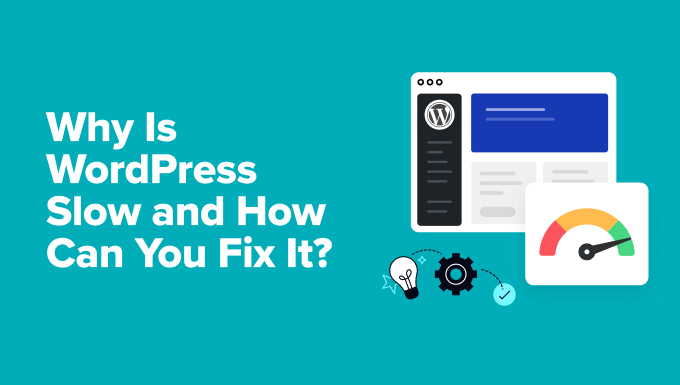
Why Is a Sluggish WordPress Web site a Downside?
Have you ever ever visited an internet site that took a very long time to load? It’s irritating, and you will have given up and gone to a distinct web site earlier than you even noticed the content material on the web page.
However even small efficiency points could be a drawback. In as of late of velocity and comfort, individuals’s consideration span is shorter than ever.
A couple of years in the past, Strangeloop ran a case examine on sluggish web sites. They discovered that even a delay of 1 second can price you 7% in conversions, 11% in web page views, and 16% in buyer satisfaction.
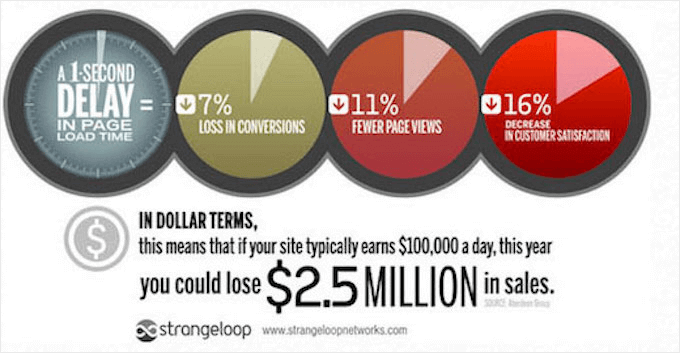
A sluggish web site may even rank decrease in search engine outcomes. Google and different serps penalize slower websites, which suggests you’re going to get much less natural visitors.
All of which means in case your web site is sluggish, then it’s important to search out out why and repair it.
How Sluggish Is My Web site and Why?
You may rapidly learn how sluggish your web site is by operating a velocity check. We cowl the various instruments you should utilize in our information on how to properly run a website speed test.
We suggest operating the check no less than 3 occasions to permit for web fluctuations and common the outcomes. You may additionally need to repeat the check utilizing completely different velocity check instruments.
Pay particular consideration to the web page load metric, which exhibits how lengthy guests want to attend to see your net web page.
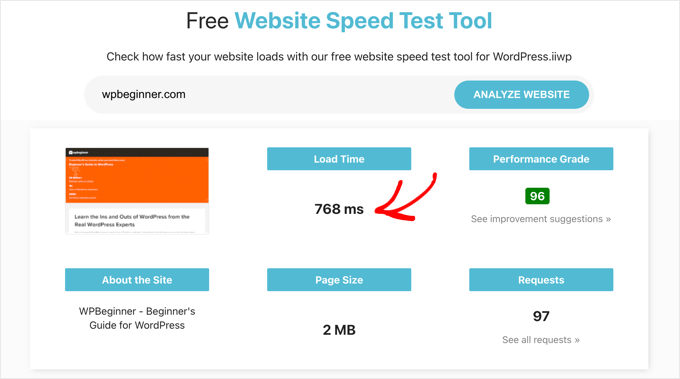
In case your web site takes longer than 2 seconds to load, then you have to discover out what’s slowing it down. Fortunately, most velocity check instruments will spotlight main issues and will let you drill right down to see detailed stories.
Now that you realize the velocity of your web site, you have to determine any points which might be slowing it down. Happily, there are many good methods to audit your web site efficiency.
For instance, you may use GTmetrix to improve WordPress site performance by operating it as a plugin or by visiting their web site to rapidly run a velocity check on any web site.
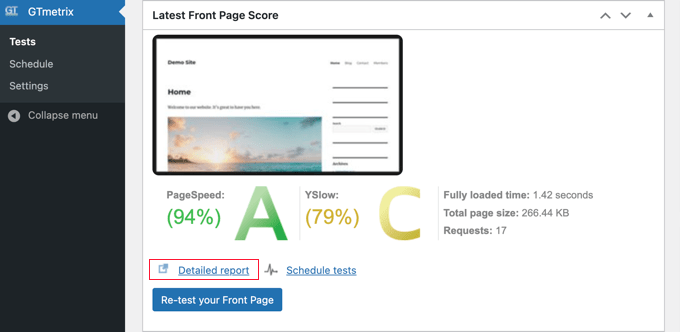
GTmetrix will give your web site a rating so you may rapidly see the way it charges.
You can too click on on the ‘Detailed report’ hyperlink to be taught extra about potential points. Inexperienced objects don’t want your consideration, whereas orange or pink objects are slowing down your website.
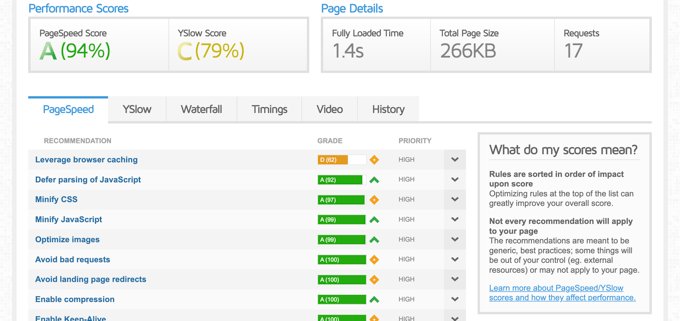
Merely clicking on a difficulty will let you know precisely what must be fastened.
With that being mentioned, let’s have a look an in-depth take a look at the primary points that sluggish WordPress down and learn how to repair them:
Your WordPress Web site Is Not As much as Date
It’s good to ensure that your WordPress web site is updated, and that features the WordPress software program in addition to your plugins and themes. Builders usually launch updates to optimize efficiency and repair bugs.
We suggest utilizing the proper update order, beginning with WordPress core after which updating your plugins and themes. You are able to do this conveniently from the Dashboard » Updates web page in your WordPress admin space.
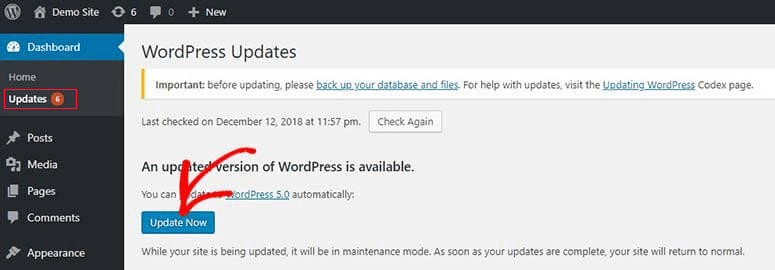
For detailed directions, please refer to those step-by-step guides:
You Are Not Utilizing a WordPress Cache
Each time somebody visits a web page in your web site, WordPress builds it dynamically from a MySQL database. This entails operating scripts and querying the database, and the tip result’s an HTML web page that may be displayed within the consumer’s browser.
When a lot of individuals go to your website on the identical time, your database will obtain many requests, resulting in slower loading occasions.
A WordPress caching plugin is likely one of the greatest methods to hurry up your web site as a result of it bypasses this course of.
When somebody visits your website, and the HTML web page is generated, it’s saved in a cache in order that it doesn’t have to be rebuilt for future guests. As an alternative, they merely view the cached web page.
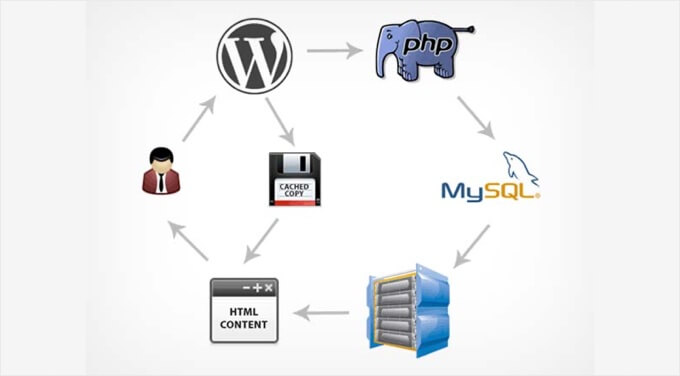
This locations much less load in your net server, and the web page will load sooner.
You may discover ways to set up the most well-liked caching plugins utilizing these guides:
You can too leverage browser caching, which shops a duplicate of the online web page and different assets on the consumer’s laptop so it hundreds sooner the subsequent time they go to.
You Are Not Utilizing a CDN
A Content material Supply Community (CDN) caches your recordsdata on a number of servers world wide. Apart from caching the generated HTML pages, it additionally shops all the different assets wanted to view the web page, together with photos, CSS stylesheets, JavaScript recordsdata, and extra.
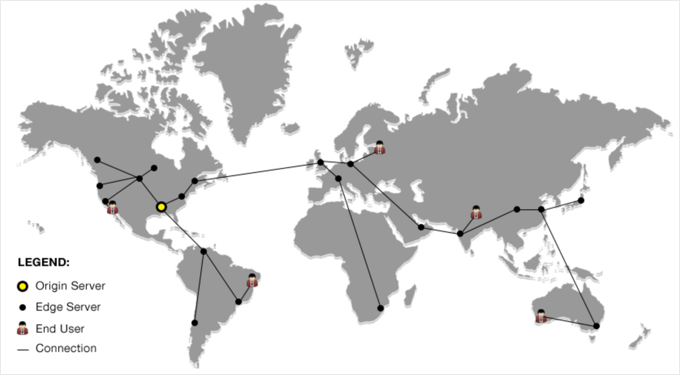
This content material is served from the server closest to every consumer. This gives massive velocity features when you have guests from many areas world wide, as we do at WPBeginner.
If you’re not already utilizing a CDN, then you may select from many wonderful WordPress CDN services:
- We use Cloudflare as a result of they provide a robust WordPress CDN with a firewall to guard your website from threats.
- We additionally suggest Sucuri, one other CDN with safety features we used for a few years.
- Bunny.net is an inexpensive choice with servers unfold the world over.
For extra info on the advantages of a Content material Supply Community, see our information on why you need a CDN for your WordPress blog.
Too Many Recordsdata Have to Be Loaded to View the Web page
Earlier than a customer can view your net web page, their browser first must request and obtain all the required recordsdata. This consists of all the photos you need to show, stylesheets that format the web page, JavaScript recordsdata that add performance, fonts, and extra.
The extra recordsdata there are, the slower the web page will load, particularly if a few of the recordsdata are very giant or are saved on a sluggish third-party server.
These are known as HTTP requests, and we’ve written an in depth tutorial on how to reduce HTTP requests in WordPress.
Probably the greatest methods to determine sluggish HTTP requests is along with your browser’s Inspect tool. The Community tab lists the assets being loaded, and the Time column exhibits how lengthy it takes every useful resource to load.
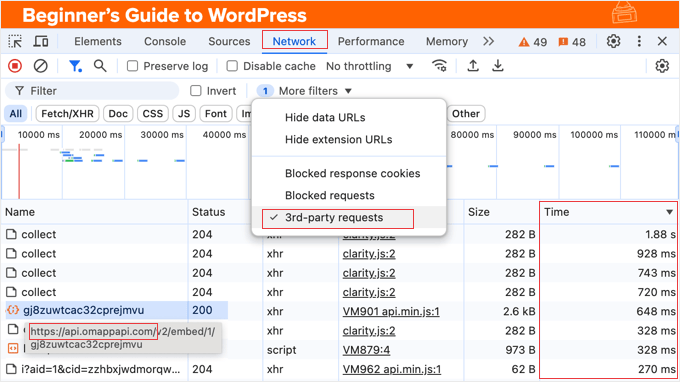
You may click on the Time column’s header twice to kind the record with the slowest assets on the high. Any that takes greater than half a second or a second to load could also be slowing down your website, though that is only a guideline.
Let’s take a fast take a look at some methods you may repair this difficulty to hurry up your web site.
First, your CSS and JavaScript recordsdata usually comprise extra info than is critical, reminiscent of whitespace and developer feedback. You may cut back the dimensions of those recordsdata by minifying them, which makes them a lot sooner to load.
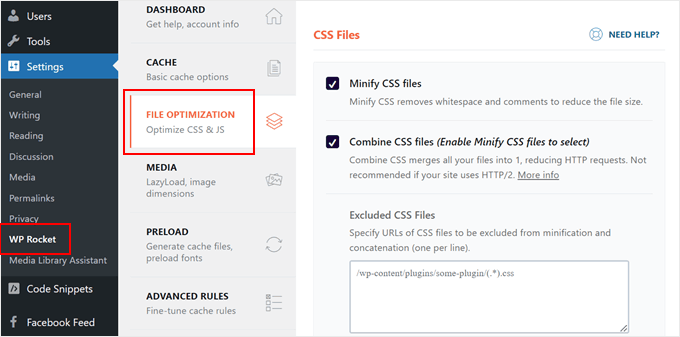
One other drawback is that all the photos displayed on the whole web page are being loaded, even when they received’t be seen till the consumer scrolls down. Lazy loading images can velocity up your web page load time by solely loading the recordsdata that might be initially seen to the consumer.
You can too lazy load videos and the comment section on the backside of the web page.
You’ll discover extra strategies within the information we talked about earlier on reducing HTTP requests.
Your Photographs Are Too Giant or Unoptimized
Probably the most frequent velocity points we see on newbie web sites is unoptimized photos. Of their unique codecs, photographs and different photos have large file sizes that take a very long time to load.
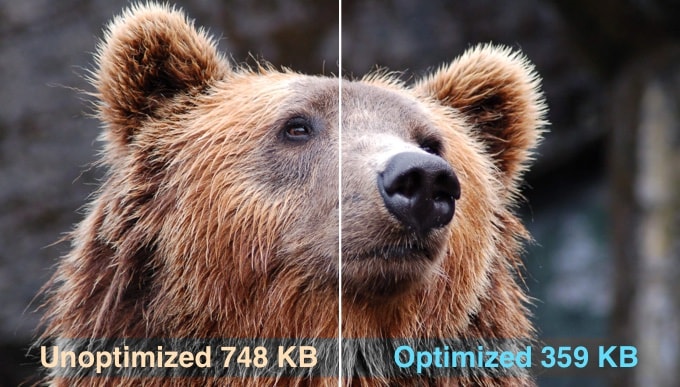
At WPBeginner, we use photo editing software to optimize our photos earlier than we add them to our web site. We resize the pictures to the peak and width they are going to be displayed at on our website, tweak the picture compression settings, and select probably the most applicable picture format.
We goal for the smallest file measurement whereas sustaining an appropriate picture high quality.
For detailed directions on optimizing your photos with out sacrificing high quality, see our information on how to optimize images for web performance without losing quality.
Movies take up much more area and bandwidth, so we suggest you don’t add them to your WordPress web site in any respect. As an alternative, it is best to use a devoted third-party video website like YouTube after which embed the videos in your weblog posts.
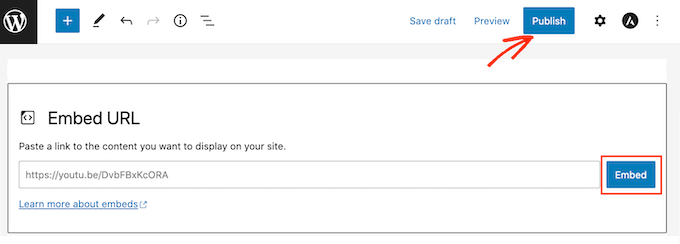
For extra particulars, see our information on why you should never upload a video to WordPress.
Your WordPress Database Is Unoptimized
As content material is added and eliminated out of your WordPress database over time, it might comprise a variety of unneeded info that may sluggish it down. This will have a critical influence in your web site’s load time.
It is very important carry out common WordPress database maintenance and optimization to take care of quick web site efficiency.
Probably the greatest methods to scrub up your database is utilizing the WP-Optimize free version. Apart from database upkeep, it may additionally assist compress your photos, take away unused picture sizes, cache your content material, and cut back the dimensions of HTML, CSS, and JavaScript recordsdata.
You may select the database administration duties you need it to carry out on the WP-Optimize » Database web page of your WordPress dashboard.
For instance, you may improve WordPress performance by optimizing database tables, eradicating pointless publish revisions, clearing auto-draft posts, and eliminating spam and trashed feedback, amongst different duties.
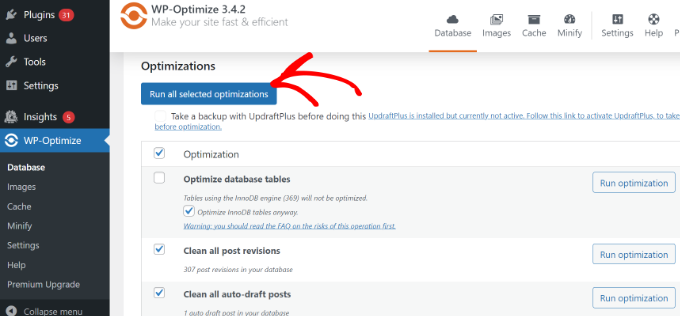
You may then run these duties by clicking a single button on the high of the web page.
For particulars on learn how to use this plugin, see our information on how to optimize your database.
You Are Operating Sluggish or Inefficient Plugins
Earlier than a web page in your web site might be loaded, WordPress first must load its core recordsdata and lively plugins. If a plugin hundreds slowly, it impacts your WordPress efficiency.
Notice that inactive plugins received’t decelerate your web site in any respect, and even having a lot of plugins installed received’t often have a big effect on website velocity. The issue is badly behaving plugins.
These are plugins that question the WordPress database greater than needed, load recordsdata from sluggish third-party plugins, or are merely bloated or supply extra options than you want.
Now we have a information on Which WordPress plugins are slowing down your site? Right here, we cowl a couple of completely different strategies that can assist you to determine plugins that behave badly.
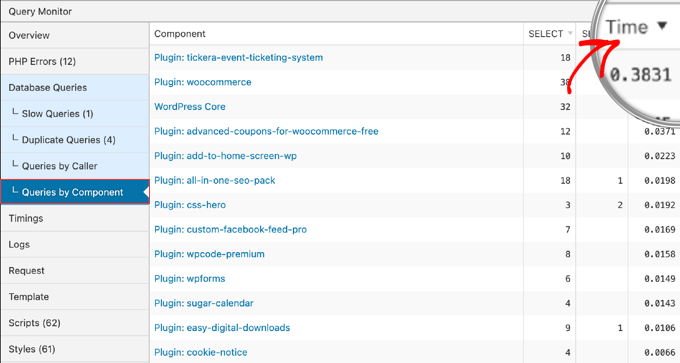
After getting discovered them, you may substitute them with different plugins which might be optimized for velocity or contact the plugin developer for support.
Your Scheduled Web site Duties Are Not Optimized
Some essential WordPress plugins run important background duties that use vital server assets and decelerate your web site.
Some examples embody:
These duties are needed, so you may’t disable the plugins.
Nonetheless, you may schedule these essential duties at low-traffic occasions when your website has fewer guests. You can too modify how continuously these plugins run to cut back pointless load in your server.

For instance, if you happen to solely publish one or two articles every week, then you may schedule your backups to run simply a few times every week after the brand new articles have been scheduled.
It is possible for you to to configure the schedule for every process utilizing the plugin’s settings.
You can too see our information on how to view and control WordPress cron jobs to discover ways to configure common duties carried out by WordPress.
You Are Utilizing Sluggish WordPress Internet hosting
Regardless of how a lot you optimize your WordPress web site, it would all the time be sluggish if you’re utilizing a sluggish or unreliable internet hosting supplier. That is why we suggest that you simply don’t use free hosting for a stay enterprise web site.
As an alternative, most small web sites can begin with a shared internet hosting plan with a good and inexpensive internet hosting firm like Bluehost or Hostinger.
Nonetheless, shared internet hosting is usually too restricted for bigger web sites with a variety of visitors, like WPBeginner. That’s why we use SiteGround’s Enterprise Cloud Infrastructure for our personal web site.
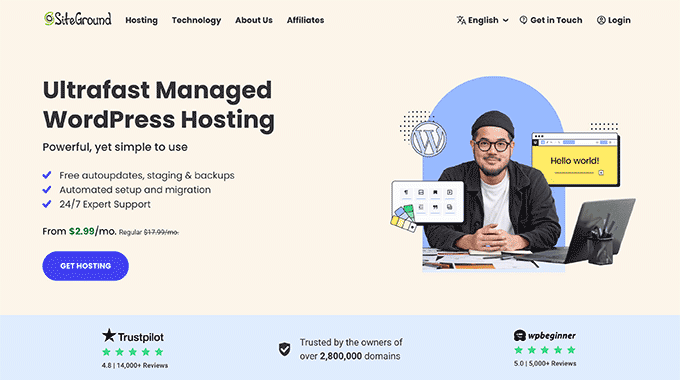
We carried out thorough velocity checks on the main WordPress internet hosting providers, together with from completely different areas world wide, and the way every supplier dealt with a variety of visitors.
You may see the outcomes of our efficiency checks in our article on the fastest WordPress hosting.
Now, altering internet hosting suppliers is an enormous step. So you might also need to see our information on the highest key indicators of when you should change your WordPress web hosting.
Your Server Software program Is Out of Date
WordPress depends on different software program to run, together with the PHP programming language and MySQL database administration system. This software program is put in in your net server.
Like WordPress and your plugins, these packages are up to date every now and then to enhance efficiency, repair bugs and safety vulnerabilities, and add new options. Using the latest version can velocity up your web site.
There may be additionally a sooner model of PHP that’s optimized for efficiency, particularly when your website is getting a variety of guests.
Ultrafast PHP is an optimized model of PHP constructed by the SiteGround crew. Since WPBeginner is hosted on SiteGround, it’s one issue that improves our web site velocity.
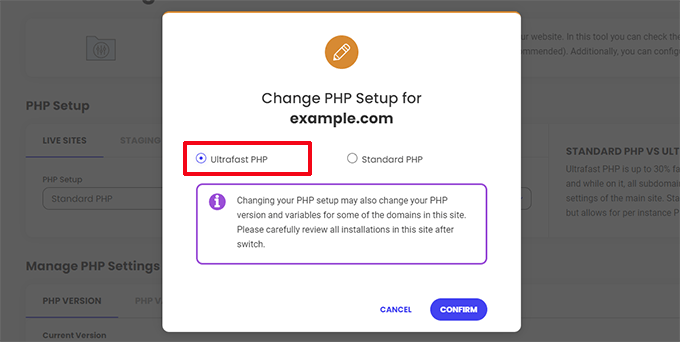
You may be taught extra in our information on how fast PHP & MySQL can boost website speed.
You Want Skilled Web site Pace Optimization
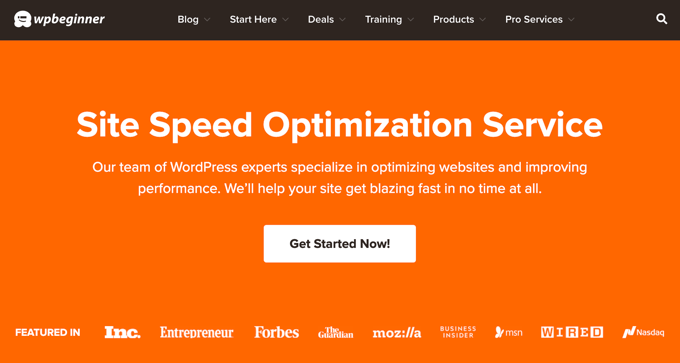
Discovering the basis causes of sluggish web sites and fixing these points can take a variety of time, particularly if you’re not tech-savvy. That’s why you could want professional assist from our skilled Site Speed Optimization Service.
Our crew will totally troubleshoot your efficiency points utilizing Google Lighthouse. We’ll do this utilizing a staging website, so your stay website’s efficiency isn’t additional compromised.
Primarily based on the report, we are going to then take confirmed measures to enhance your web page loading time, server efficiency, and technical aspects of WordPress SEO, together with the strategies we’ve coated on this article.
We additionally overview and optimize the plugins you might be utilizing, tackle server optimization points, clear up your WordPress database, deal with picture compression, and way more.
Plus, pricing for our website velocity optimization service begins at simply $699. Schedule a free call with our professional crew immediately!
We hope this tutorial helped you be taught why your WordPress web site is sluggish and learn how to repair it. You may additionally need to see our information on how plugins affect your site’s load time or our professional tips to improve your WordPress site health check score.
In the event you favored this text, then please subscribe to our YouTube Channel for WordPress video tutorials. You can too discover us on Twitter and Facebook.


